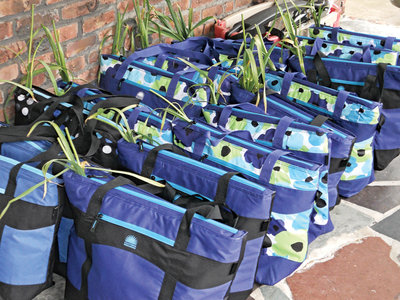Red leaf lettuce, daikon radishes, golden beets and garlic scapes. These are just a few of the words that are part of Lisa Van Den Berg’s daily vocabulary. What exactly is a garlic scape, you may ask? How about patty pan squash? Or purslane?
All of them are vegetables that residents of Weehawken, Union City, and other Hudson County residents will soon start picking up each Wednesday between 6 and 8 p.m. at St. John’s Church in Union City.
Van Den Berg and her husband, Albert, grow them on their farm in Upstate New York, along with bushels full of more familiar vegetables like romaine lettuce and spring onions. They are part of a Community Supported Agriculture (CSA) organization that partners farmers with consumers who want to support local growers by purchasing their produce, and who appreciate the difference between a locally-grown vegetable and a corporate-grown product shipped in from Florida or California or Argentina.
CSAs like Van Den Berg’s are membership-driven organizations that supply a bag of vegetables once a week to each customer, from the second week in June to the end of November when the growing season is over. The vegetables vary from week to week, depending on which ones have come to full harvest.
The magic of ‘black dirt’
“There is nothing better than eating a tomato picked right off the vine warmed by the sun,” Van Den Berg said. “It’s the way they were meant to be eaten.”
That means members get more than a bag of vegetables delivered each week – they get the sun, the rain, and the soil that went into creating this food. And, it’s not just soil, Van Den Berg is careful to point out; it’s “black dirt.”
Originally discovered by an early wave of German, Polish and Dutch farmers, this is dirt in which you can grow anything. It’s so soft that you can’t plant a tree in it because the soil can’t support the tree’s roots. A tractor running over the soil makes the ground shake “like Jello.”
“It’s a gift,” Van Den Berg says, “but in a way a curse too. Because anything grows, and that includes weeds.”
When she and her husband first started farming, she was on her hands and knees pulling weeds as well as planting seeds. Their business started out with 12 clients.
Now, less than 10 years later, they have about 290 clients and she has help with the planting and the weeding.
It’s still hard work, but it’s the kind of work that’s in her blood. But she didn’t always know that.
Though she came from a farming family – she says with a smile that she’s probably a “200th generation farmer” – her first passion after graduating from Southern Illinois University, was journalism. She even landed a job as editor-in-chief of her local newspaper. But it was always the human interest stories that drew her in, the human spirit, the human questions, so she took off for Switzerland to study Transcendental Meditation.
And then she read a book that changed her life.
In “The Long Emergency,” James Howard Kunstler proposes an argument called “Peak Oil.” He postulates that in the not too distant future, oil production will be so difficult and expensive that we will all learn to live on a smaller scale, to become more communal and – what spoke most eloquently to Lisa Van Den Kirk – to harvest our food locally. It is a heartfelt message that speaks to her to this day.
Journalism and meditation all led her back to her roots, but in a way that coalesced as a life’s journey. She married, had children, and began farming. She and her husband wound up in a community in upstate New York where a transcendental meditation center was also located. It is an even happier stroke of luck that they were looking to sell off some of their land.
A new view of the food we eat
In Greek mythology, the Hesperides were three often-unnamed nymphs who tended a garden of golden apples which were said to impart immortality on people who ate them. Eating your vegetables, good ones, grown locally with love, may not make you immortal, but it will certainly make you healthy.
Thus, she named her cooperative Hesperides Organica.
And what about garlic scapes? They are the stalks of the hardneck garlic and are delicious. You can grill them, add them to a salad, or make them into a pesto. They’re one of the surprises in the weekly vegetable bag; a way to expand your experience of the food you can eat and enjoy.
It’s more than picking up the weekly vegetables – it’s a first step into a new way of thinking about what we eat and where our food is grown.
